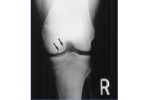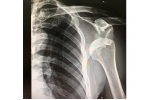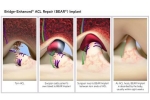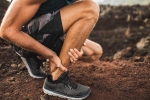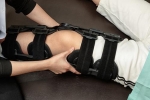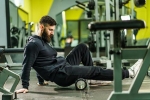Blog Archive
How Do I Treat My Cartilage Injury?
Knee cartilage injuries can be challenging to treat due to the limited regenerative capacity of cartilage. The appropriate treatment depends on the severity of the injury, the patient's age, activity level, and overall health. Here are the main treatment options for knee cartilage injuries: Non-Surgical Treatments Rest and Activity Modification...
What is a Bony Bankart Injury (Shoulder Dislocation)?
A Bony Bankart lesion is a specific type of injury to the shoulder, particularly the glenoid, which is the socket part of the shoulder joint. It occurs when a portion of the bone of the glenoid is fractured along with the detachment of the anterior-inferior labrum due to shoulder dislocation....
Tell Me About the BEAR ACL Surgery
The BEAR (Bridge-Enhanced ACL Repair) procedure is an innovative technique for repairing anterior cruciate ligament (ACL) tears. Unlike traditional ACL reconstruction, which involves replacing the torn ligament with a graft (from either the patient's own tissue or a donor), the BEAR procedure aims to preserve and heal the patient's original...
How To Treat Ankle Sprains
Ankle sprains are common injuries that can range from mild to severe. The treatment approach depends on the severity of the sprain. Here are the general treatment options categorized by severity: General Treatment Approach for Ankle Sprains Initial Treatment: R.I.C.E. Protocol Regardless of the severity, initial treatment typically follows the...
Do I Need Surgery for a Rotator Cuff Tear?
ChatGPT Rotator cuff tears are a common shoulder injury that can cause pain, weakness, and limited range of motion. Treatment options vary depending on the severity of the tear, the patient’s age, activity level, and overall health. Here are the primary treatment options for rotator cuff tears: Non-Surgical Treatments...
Which ACL Graft is Best?
The choice of graft for anterior cruciate ligament (ACL) reconstruction surgery depends on various factors, including the patient’s age, activity level, personal preferences, and the surgeon’s experience. Here are the most common types of grafts used for ACL reconstruction, along with their pros and cons: 1. Autografts (Tissue...
Do I Need a Brace after Knee Surgery?
Welcome to another episode of Ask The Sports Docs. We get a lot questions from our listeners each week and they’re great questions, so rather than responding individually we thought we’d do these mini episodes where highlight some of the best questions and our responses. So, let’s get started! Today’s...
Speed Up Muscle Recovery In Between Games
Speeding up muscle recovery between tournament games is crucial to maintaining peak performance. Here are some strategies that can help: 1. Hydration Drink Plenty of Water: Dehydration can impair muscle function and recovery. Aim to drink water regularly before, during, and after games. Electrolyte Replacement: Use sports drinks or electrolyte...
Treatment of Meniscus Root Tears
Root avulsion of the meniscus is a serious injury where the attachment of the meniscus to the tibia is torn. This can lead to significant knee instability, pain, and degenerative changes such as early osteoarthritis if not treated properly. Here are the treatment options for root avulsion of the meniscus:...
Proper Hydration is Crucial During Sports Tournaments
Proper hydration is crucial for maintaining optimal performance during tournaments. Here are some guidelines to help you stay well-hydrated: Pre-Tournament Hydration Start Hydrating Early Begin hydrating at least 24 hours before the tournament. Drink plenty of water throughout the day leading up to the event. Monitor Urine Color Aim for...

